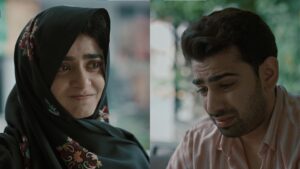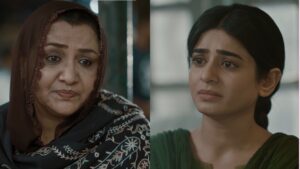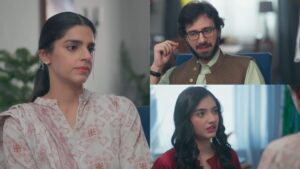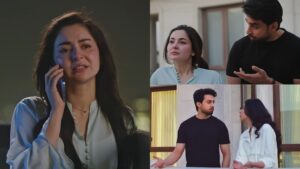The Hum Tv rom-com ‘Meem Se Mohabbat’ has taken over the internet for all the right and wrong reasons. Many have praised the powerful lessons the show has taught about overcoming trauma, single parenting and the struggles differently-abled children face. However, the pressing concern that seems to have divided the internet is whether the show’s central relationship between Talha (played by Ahad Raza Mir) and Ayat Suleman (played by the phenomenal Dananeer Mobeen) is a wholesome romance or another toxic relationship our television shows seem to be normalising. Let’s break down all of this in detail, and decide for once that whether ‘Meem Se Mohabbat’ is this generation’s rom-com or another toxic show.

Let me lay out the entire picture about what the drama is really about. The drama stars Ahad Raza Mir, Dananeer Mobeen and Asif Raza Mir as central leads in a story about how to people with opposite personalities came to fall in love with each other. Talha Ahmed is the CEO of an engineering company, and is the sole parent of Mohid, the son of his brother who had passed away along with his wife in a horrible car crash. Because of the sole responsibilities of being a single dad, Talha is incredibly reserved and strict with his employees.
Read more:
Meem Se Mohabbat: social media users are elated with Ahad Raza Mir’s comeback to dramas
Ayat (who is also referred to as Roshi by her family) is completely the opposite: she is carefree and free-spirited. After she fails to take the engineering test once more, her family decides to enrol her in an internship program at Talha’s company in hopes that she might learn the importance of responsibility, and then follow her family’s footsteps to become an engineer. Roshi begins clashing heads with Talha from the moment she arrives because of her careless attitude that often disrupts important projects or causes mayhem’s at work like the kettle exploding. But she begins getting extremely close to Mohid, and also his grandfather (played by Asif Raza Mir), which ultimately leads to her falling in love with Talha.

Roshi soon begins evolving into a more responsible person as her crush for Talha keeps growing, and she even goes back to university so that she could impress him by taking on more senior roles in on-going projects. Other family members also seem to be in approval of the relationship like the grandfather, who urges Talha several times to marry Roshi because of the way she had gotten close to Mohid. However, in the recent episodes 19 and 20 Talha chooses to suppress his feelings and tells Roshi that he was firing her from the company because she had crossed boundaries. Roshi is left heartbroken, and Talha explains later that he had done this because he knew that she would become unhappy with him and the baggage he carried.

Now given the synopsis of the story, lets delve into the fact is Talha and Roshi’s relationship worth rooting for or not. Many internet users, like this one below, have argued that the age gap is not such a controversial thing because it was also present in Umeed and Farjaad’s relationship in ‘Fairy Tale’ and also in the classical PTV drama ‘Dhoop Kinare’.

We should clarify that the reason why ‘Fairy Tale’ was considered an earth shattering hit was because unlike Roshi, Umeed was not a high school student but she was in university at the time the show began airing. There was no imbalance in their relationship because Umeed was incredibly ambitious even though she wasn’t academically driven, she had a dream to become financially independent and did not want to marry someone just to settle down. Umeed and Farjaad’s relationship was endearing for women because this was a woman who was never respected by her family members, and he was the only one recognised her fire and helped her achieve her dreams.
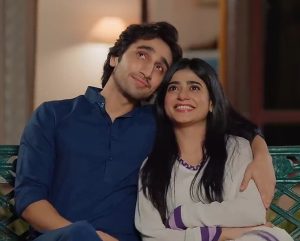
And in a similar way, a Twitter user has pointed out that in no way was Talha and Roshi’s relationship similar to the one of Ahmer and Zoya in ‘Dhoop Kinare’, because unlike Roshi, Zoya was a successful and financially independent doctor. Roshi, in comparison to both of these dramas, has no interests or dreams other than getting married just so that she could escape the pressure of working hard. There is a toxic imbalance in their relationship because she is a woman with no worldly experience or professional skills, and is being shipped with a man who is more financially powerful and therefore, has the upper hand in the relationship.

We agree that there have been several dramas in the past few years that have featured age-gap relationships and they had a succesful run with audiences. Take for instance the show ‘Dobara’ starring Hadiqa Kiani as a middle-aged woman, who defies stereotypes and chooses to fall in love with a man younger than her. Once again, we must point out here that the relationship did not feature a literal minor who had no college degree or work experience, but Maahir (played by Bilal Abbas) was a consenting adult who does not hold back Mehrunisa (played by Kiani) from her dreams, but also finds the courage in re-inventing himself through her.
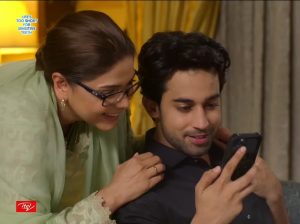
Along with this, many users have criticised how the show does little to assuage the idea that there is no problematic power dynamic between the two, as Roshi is often caught in situations where Talha has to rescue her and lecture her about how she must go about in the world. One instance we can recall is when Roshi is intoxicated at a party and Talha is the one who drives to rescue her and then lectures her about not spending time with strange men she has met once.
An X user pointed out that through such situations, Talha acted more like Roshi’s life coach rather than as an equal partner who learns stuff from her as well. We also agree that the show would have been a joy to watch had the creators been more conscious about not having Ayat played by a literal 23 year old.
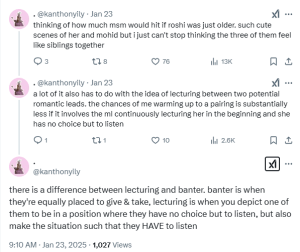
So in conclusion, ‘Meem Se Mohabbat’ is not a rom-com that was made keeping Pakistani women in mind, but rather its another example of the regressive stereotypes our television industry seems to never let go off. It’s incredibly disappointing that in a sea of rom-coms dramas that had progressive messages and healthy relationships featuring men who respected and empowered the women in their lives, the show creators are pedalling back on all the efforts made by the entertainment industry by trying to normalise a relationship between a young adult and a single dad.




